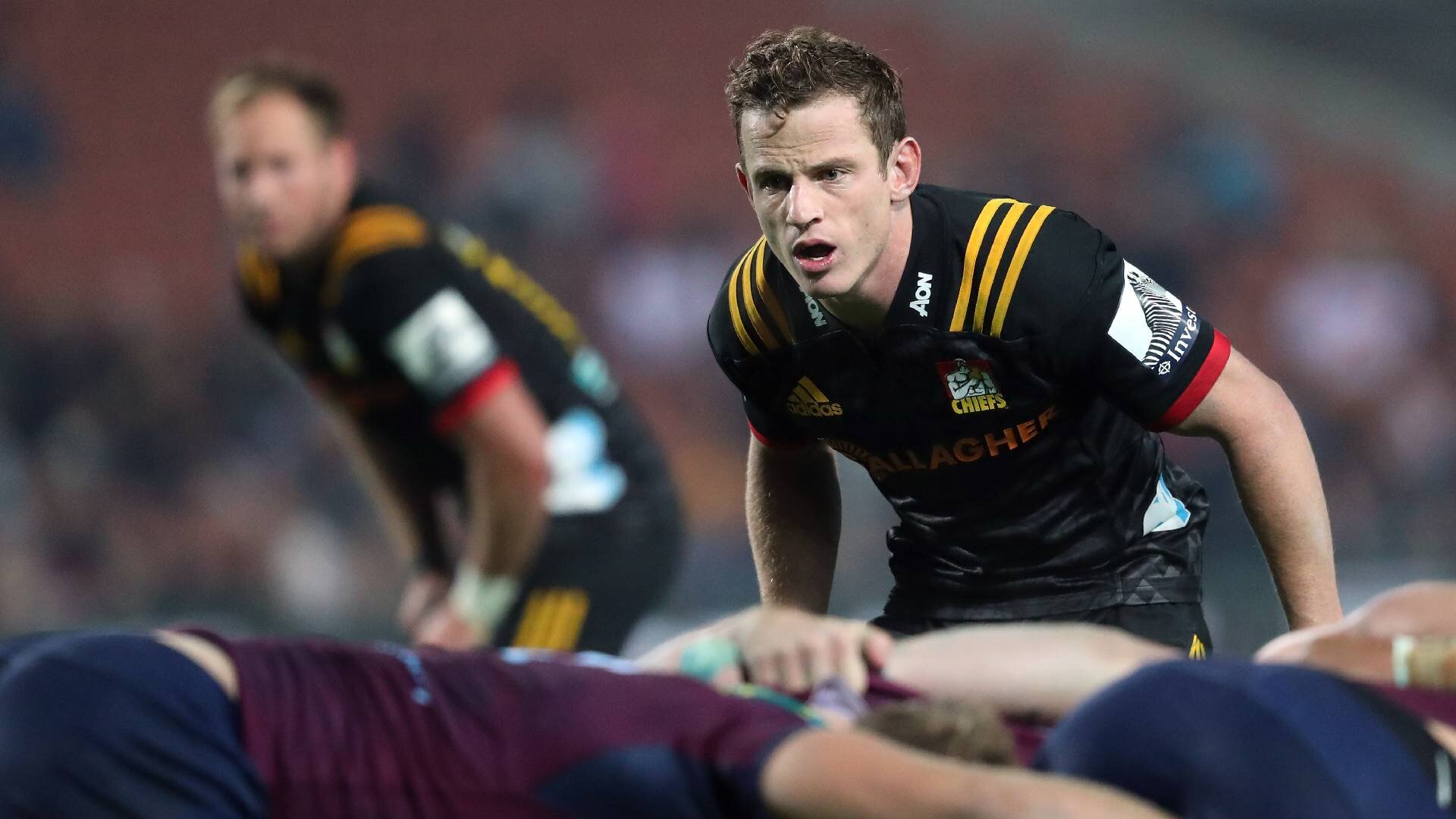From Otago reject to World Cup hopeful: The secret behind Brad Weber's stellar season

The Chiefs hosted their annual awards night at SKYCITY in Hamilton on Wednesday night, with their best and fairest players receiving the recognition they deserved for their efforts throughout the 2019 campaign.
It’s been a testing season for the two-time champions, too.
Three wins from their opening 10 matches had the potential to seriously threaten their streak of seven consecutive play-off appearances since 2012.
Add to that the season-ending knee injury to star playmaker Damian McKenzie in mid-April, and many had written the Chiefs off as New Zealand’s wooden spoon-winners.
A turn in fortune, though, has seen the Hamiltonians collect four wins and a draw in their six most recent matches, and within the space of a month-and-a-half, they have miraculously transformed from competition cellar-dwellers to quarter-finalists thanks to their 59-8 crushing of the Rebels in Melbourne on Friday night.
Leading their unlikely charge to the play-offs is livewire halfback Brad Weber, who has been integral to the Chiefs’ post-season aspirations.
His experience, nippy running game, and all-round leadership has helped the side overturn their five-match winless streak to start the year and force themselves into play-off contention in a matter of weeks.
Should the Chiefs have failed to emerge from Melbourne with a quarter-final berth, Weber could have taken solace in the fact that his efforts hadn’t gone unnoticed, as he was awarded coaches’ player of the year, and fans’ player of the year three nights ago.
It is fantastic reward for a player whose decision to skip the Maori All Blacks’ tour to South America last year has paid dividends.
“It probably started way back toward the end of last year,” Weber told RugbyPass of his unexpectedly sparkling form during an exclusive interview earlier this week.
“I pulled myself out of the Maori tour a couple weeks early just so I wouldn’t miss any of the pre-season for the Chiefs, because if I went on the full tour, I wouldn’t have come in until just before Christmas.
“I actually had a full pre-season this year, and I’m in the best nick physically that I’ve ever been in.
“I reckon that’s probably gone a long way to helping me play better because I just feel so much more clearer and better out on the field.”
Many of Weber’s admirers, however, are calling for more than just a pair of end-of-season awards to recognise the 28-year-old’s exploits.
With no clear-cut third-choice option at halfback available to the All Blacks, the race is well and truly on to accompany incumbents Aaron Smith and TJ Perenara at this year’s World Cup in Japan.
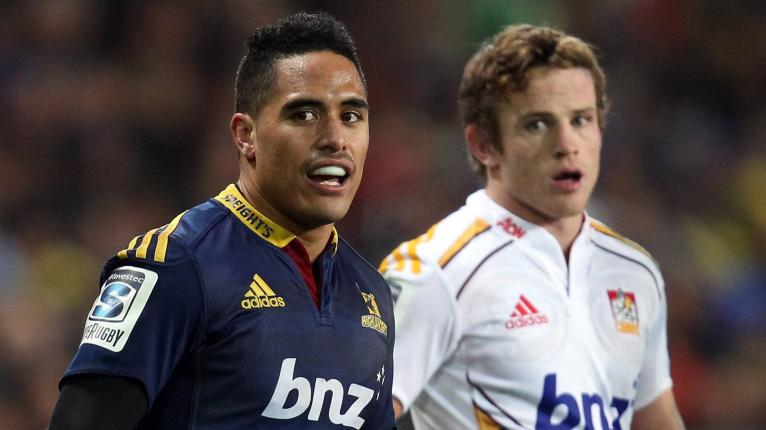
Although he’s been left in the wilderness at international level over the past four years, Weber’s irresistible Super Rugby form has forced him back into the All Blacks’ selection mix, just as much as it has resurrected the Chiefs’ seemingly flailing 2019 campaign.
He has competition, though, in the form of Chiefs teammate Te Toiroa Tahuriorangi, who played three tests for the national side last year, and Crusaders duo Bryn Hall and Mitchell Drummond.
You could excuse Weber for getting caught up in the hype of All Blacks selection in a World Cup year, but, along with his prime physical condition, the one-test halfback also attributes his electric form to his ability to deflect such distractions.
“In previous years, I reckon I let the All Blacks selection probably consume me a bit too much, and it probably affected me negatively on the field,” he said.
“That’s not been my mindset this year, that I could play the best rugby of my life and still not get picked, and that’s a possibility and I’m pretty at peace with that.
“I can’t control selection, all I can control is how I play, so that’s been a huge mind shift for me, and, honestly, it’s like a weight off my shoulders, which has been great for me.”
That statement is symbolic of the maturity and wisdom that Weber has accumulated from years of his own triumphs and disappointments.
While his career-best form has been earning him superlatives from across New Zealand this year, things haven’t always panned out so smoothly for the former University of Otago student.
Moving south to Dunedin after graduating from Napier Boys’ High School alongside Hawke’s Bay, Hurricanes and All Blacks flanker and school friend Gareth Evans, Weber kicked off his professional career in the ITM Cup with Otago in 2012.
Largely confined to cameos from off the bench due to the presence of Japanese international Fumiaki Tanaka, Weber made nine appearances in a season which saw the Razorbacks fall short of promotion into the ITM Cup Premiership after losing 41-16 to Counties Manukau in the Championship final.
A stellar season with club side Dunedin a year later left many within local club rugby circles expecting him to win selection back into Tony Brown’s side as the form halfback in the Otago metro competition.
However, he was dropped as the province’s second-choice halfback in favour of 19-year-old Josh Renton, who had flourished at schoolboy level the year before with Otago Boys’ High School and New Zealand Schools.
It was the first of numerous setbacks in Weber’s career, but he believes his omission came with a silver lining.
“To be honest, that was probably the kick up the ass that I needed, because I’d been playing alright for the Sharks [Dunedin], but I didn’t actually work that hard on my core skills, and Tony Brown, by not selecting me, made me realise that I needed to do more than what I was actually doing,” he said.
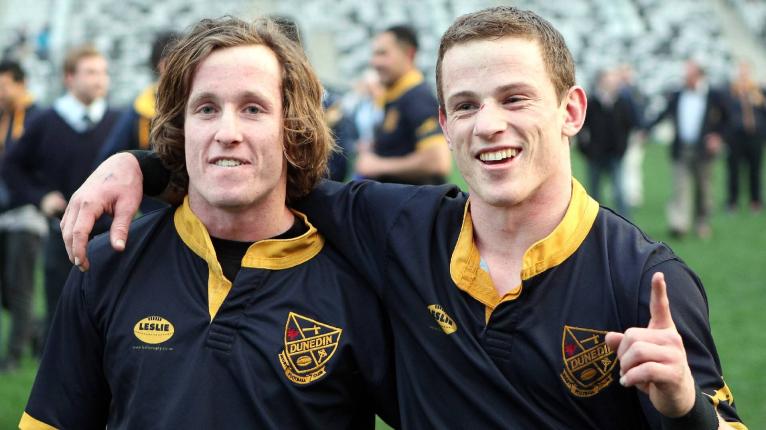
“I don’t even think I really deserved to make the Otago team that year, and it was actually a little bit of a blessing in disguise.
“Ever since then, I just do everything possible to get my core skills better, because I know that my speed and all that sort of carry on, I know that my point of difference is always going to be my strength, but to be a good halfback, you need those core skills.
“Josh and Fumiaki were streets ahead of me in that department I think, at the time.”
Consigned to seeing out the rest of 2013 as a full-time student, a disappointed Weber was thrown an unexpected lifeline by Waikato and the Chiefs.
“Tom Coventry was a coach at the Chiefs at the time, I knew him from my Hawke’s Bay days,” Weber recalled.
“He gave me a call and said that Brendon Leonard was going overseas, so they had a third halfback spot open up, and I said to him ‘I’ve missed out on the Otago team, so how are you going to see me play?’, and he said ‘If we can sort something out elsewhere, would you be keen to move?’, and I said ‘Hell yeah I’d be keen, I’ll go anywhere.’
“Luckily enough, Trent Renata was at the Sharks at the time, and he was playing for Waikato, so got in a real good word with me there.
“Then, on top of Tom and the Chiefs coaches being keen to see me, Johnny Walters, the Waikato coach, called me up on a Friday, and then I played Otago Development on the Saturday and then flew up to Waikato on the Sunday and played for them a couple weeks later.”
From there, there was no looking back for Weber, who took full advantage of the opportunity with a string of commanding performances, and, as it turned out in the long run, Otago’s loss was very much Waikato’s – and the Chiefs’ – gain.
So good was the diminutive scrumhalf for the Mooloos that then-Chiefs head coach Dave Rennie was knocking on his door offering him a Super Rugby contract for the 2014 season as the back-up to Tawera Kerr-Barlow and Augustine Pulu.
“I couldn’t believe it, I was like ‘What the hell has just happened?’
“In about two weeks, I went from thinking I was just going to be a student for the rest of the year to having a full-time rugby contract.
“It was mind-blowing.”
The 2014 campaign was a year of learning for Weber, who had limited game time behind Kerr-Barlow, who had been an All Black since 2012, and Pulu, who would go on to earn two test caps against the USA and Scotland later in the year.
Pulu’s chance in the national set-up came as a result of a serious knee injury sustained by Kerr-Barlow against South Africa in that year’s Rugby Championship, which helped pave the way for Weber to make an impression at the Chiefs with more minutes in Kerr-Barlow’s absence.
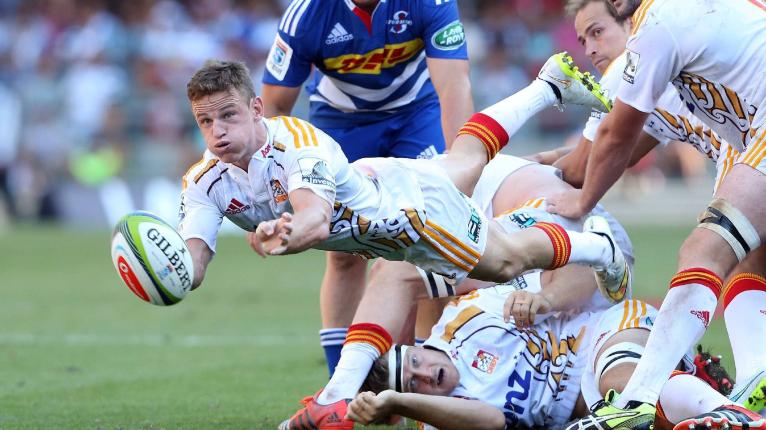
He and Pulu shared halfback duties throughout 2015, until the Chiefs’ season was ended at the quarter-final stage by the Highlanders at Forsyth Barr Stadium in Dunedin.
As he had done at club and ITM Cup level, Weber impressed onlookers with more widespread exposure at Super Rugby level, to the point that when the All Blacks’ 41-man Rugby Championship squad was named in preparation for that year’s World Cup, many were outraged that he had missed out on a spot to Kerr-Barlow, who had yet to play that year.
However, with Smith and Perenara unavailable for selection due to their involvement in that year’s Super Rugby final, and with Kerr-Barlow released from the squad to play for the Maori All Blacks as he continued his injury recovery, those concerns regarding Weber’s exclusion from the squad were quickly alleviated.
He and Crusaders veteran Andy Ellis were thrust into the squad as the fourth and fifth-ranked halfbacks in New Zealand ahead of the All Blacks’ historic clash against Samoa in Apia, a match which Weber was named on the bench for.
“Getting that call-up for that test for the ABs was mind-blowing,” he said of his selection.
“Within two years, I’d gone from being dropped from Otago to getting a call-up for the All Blacks, so I just couldn’t believe it at the time.”
The magnitude of the occasion wasn’t significant for just Weber and his fellow All Blacks debutants – George Moala, Nepo Laulala and Charlie Ngatai – but for the entire rugby-mad nation of Samoa, which was hosting its first-ever test against the All Blacks.
Wherever the All Blacks went throughout the week, hordes of passionate Samoan rugby fans followed, and they didn’t relent on match day at Apia Park.
“It was bloody hot, man, like 30 plus degree and humid as, and all these screaming Samoans sort of baying for our blood,” Weber said.
“Samoa played really well that day as well, so it was certainly one of the most high-pressure moments I’ve ever been involved in as a young fella back then.
“I think I got hit a couple of times too, for good measure.”
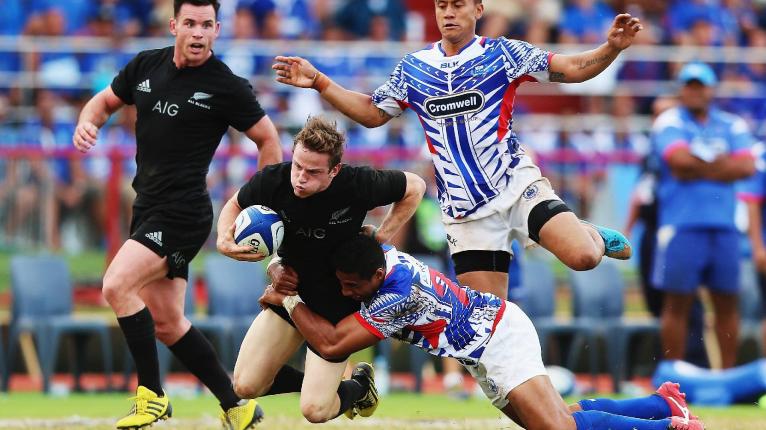
While his 17-minute showing from the bench in the All Blacks’ 25-16 victory is the only international rugby Weber has played to date, it contributed to a memorable season, which included Ranfurly Shield success in his final domestic campaign with Waikato.
It’s not as if the hat-trick hero could easily forget snatching the Log o’ Wood in a 36-30 thriller against his home province and the side he currently plays in the Mitre 10 Cup for, Hawke’s Bay.
“I still get reminded about it all the time when I’m down at the Bay,” Weber joked.
“If I’m doing any promo, the one question anyone asks is why did I do it, but I’d do it all again. We ended our season there, so it was the best week of my life after that, we sent it well and truly.
“We were just so young and had such a young team, with Anton [Lienert-Brown] and Damian [McKenzie] and Shaun Stevenson and the likes, we had nothing to lose and just ripped in.”
Weber’s father, Neil – who also played for Hawke’s Bay along with his own father – might be Weber’s harshest critic of all Magpies supporters when it comes to that Ranfurly Shield clash.
“They had this sponsor’s thing before the game, and he was the guest speaker that night, and he said they asked him ‘What do you want to happen in the game tonight?’, and he said ‘I hope Brad plays well but I hope Hawke’s Bay win’, so he had a few mixed emotions when I scored three tries and won it.”
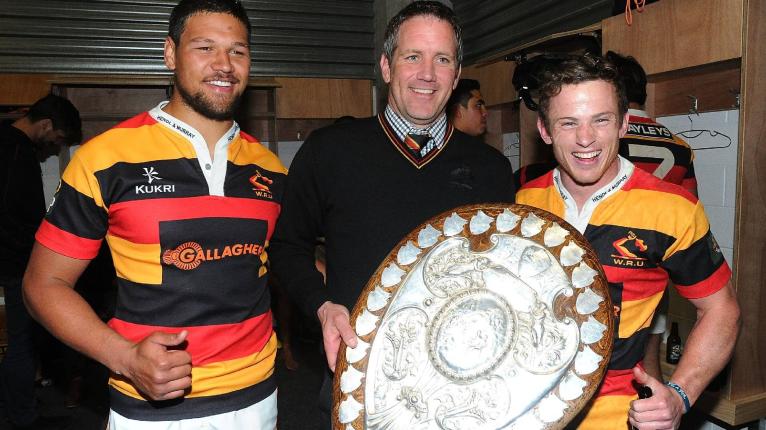
The ecstasy of playing for the All Blacks and winning the Ranfurly Shield in 2015 slowly dissipated, though, as Weber’s growing success naturally yielded more ambitious personal goals.
Hungry for more appearances in the black jersey, one of his key goals heading into 2016 was to make it back into Steve Hansen’s All Blacks squad.
It was a tough ask, given that none of Smith, Perenara nor Kerr-Barlow had moved on following the All Blacks’ World Cup glory, and so when Weber’s name was missing for the June series, Rugby Championship and end-of-year tour, disappointment ensued.
Eager to make amends for his continual omission from the national set-up, and with the British and Irish Lions tour on the horizon, 2017 loomed as a big one for Weber.
Even more so when Kerr-Barlow confirmed his departure to Top 14 club La Rochelle that March, but his chances of capitalising on his teammate’s yet-to-be-announced exit were nullified at the inaugural Brisbane Tens in February.
A broken femur three minutes into the Chiefs’ 12-7 grand final win over the Crusaders at Suncorp Stadium drastically cut short Weber’s season, ruling him out of action for the Lions tour and the entire Super Rugby campaign.
“I had seven months off in the end, and played the last six or seven games for Hawke’s Bay,” he said.
“It wasn’t really quite right, I was having heaps of pain in my hip from where the prod and the screws were.
“When I came back, I was pretty unfit, match unfit anyway, so having the full pre-season certainly helped that, although it’s probably still taken me two years to fully get over the injury and get back to myself, I reckon, which has been cleared this year.”
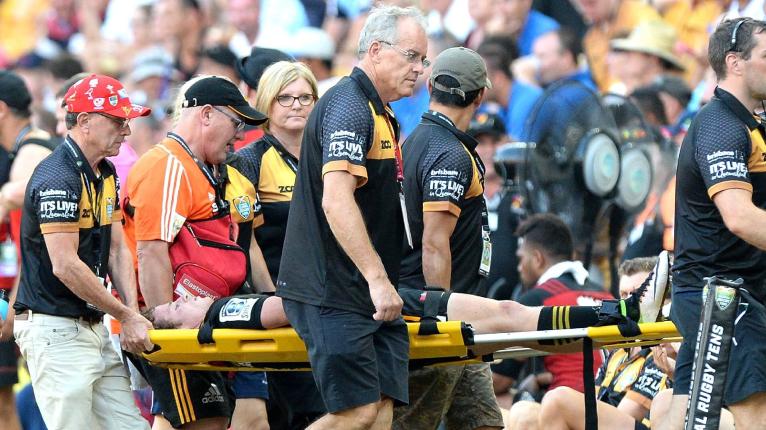
2018 proved to be more fruitful, playing his way back into national contention en route to the Chiefs’ quarter-final finish.
Still, though, he wasn’t able to force his way into Hansen’s squad, even without Kerr-Barlow blocking his path, with young, inexperienced teammate Tahuriorangi the preferred third-choice option, to the surprise of many.
Being ignored by the All Blacks for a third consecutive season was Weber’s catalyst for change, as his shift in mindset from focusing on national selection to focusing solely on the Chiefs and Hawke’s Bay has impacted his game for the better.
“It was probably the whole of last year I was thinking that way, and it wasn’t until the start of pre-season that I realised having that sort of thinking is just ridiculous, it’s just not going to be good for me.”
Although Weber is playing down his All Blacks hopes and will focus exclusively on next week’s quarter-final in the coming days, plenty of others have toyed with the idea of him adding to his test tally later this year.
Sitting in first-equal for most tries (five), first for most running metres (405), first for most tackles (114), fourth-equal for most line breaks (five), sixth-equal for offloads (seven) and having played the second-most minutes in Super Rugby this year (969) of all halfbacks in the competition, it’s clear to see why he’s a wanted man by All Blacks fans.
Add to that the variety of challenges he’s overcome, from – rightly or wrongly – missing out on Otago selection to a teenager who has floundered in the professional ranks, through to being robbed of an appearance against the British and Irish Lions due to his broken leg in 2017.
Both of those setbacks have been complemented by constant exclusions from the All Blacks set-up over the years, for one reason or another.
There has been a noticeable difference in Weber’s game this year, though, and the conceivable prospect of him winning re-selection back into Hansen’s squad ahead of the World Cup would be huge reward for his unwavering persistence across all levels of the game in New Zealand.
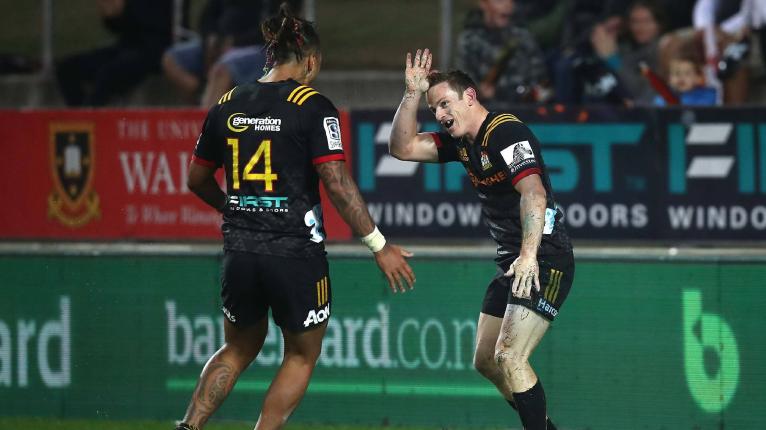
Being denied a spot in the Otago squad by Renton, competing with Kerr-Barlow, Pulu and Tahuriorangi at the Chiefs, and having to bide his time behind Smith, Perenara, Kerr-Barlow and then Tahuriorangi in the queue for the All Blacks over the course of six years could have been enough for Weber to pack his bags and head abroad.
He’s good enough to dominate in the Japanese or European club scene, and with test experience to his name, he could have demanded a hefty salary compared to what he and most others will be earning in New Zealand.
However, he has opted to stay put and continue to plough away with the Chiefs and Magpies in the hope that he will be able to push for that elusive All Blacks re-call.
“It would be massive, it would be hugely satisfying,” Weber said of what it would mean to him to represent his country again.
“All of what I’ve worked to over the past few years would be all worth it, and the decision to come into pre-season early just so I can get into good nick and give it a real decent crack would just be incredibly satisfying.”
In saying that, his focus remains firmly on the Chiefs, as it has been all season, with a quarter-final against either the Crusaders in Christchurch or Jaguares in Buenos Aires still to play.
“Whichever way it goes, I’ll be happy with my season regardless, so it’s [an All Blacks call-up] not the be-all-and-end-all for me.”
In other news:




























